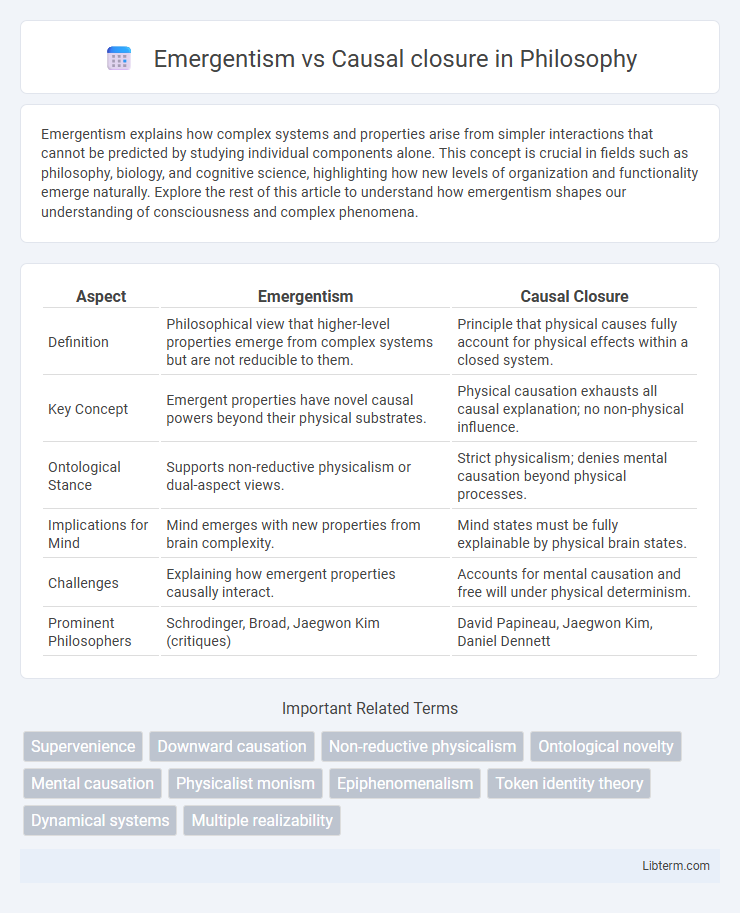Emergentism explains how complex systems and properties arise from simpler interactions that cannot be predicted by studying individual components alone. This concept is crucial in fields such as philosophy, biology, and cognitive science, highlighting how new levels of organization and functionality emerge naturally. Explore the rest of this article to understand how emergentism shapes our understanding of consciousness and complex phenomena.
Table of Comparison
| Aspect | Emergentism | Causal Closure |
|---|---|---|
| Definition | Philosophical view that higher-level properties emerge from complex systems but are not reducible to them. | Principle that physical causes fully account for physical effects within a closed system. |
| Key Concept | Emergent properties have novel causal powers beyond their physical substrates. | Physical causation exhausts all causal explanation; no non-physical influence. |
| Ontological Stance | Supports non-reductive physicalism or dual-aspect views. | Strict physicalism; denies mental causation beyond physical processes. |
| Implications for Mind | Mind emerges with new properties from brain complexity. | Mind states must be fully explainable by physical brain states. |
| Challenges | Explaining how emergent properties causally interact. | Accounts for mental causation and free will under physical determinism. |
| Prominent Philosophers | Schrodinger, Broad, Jaegwon Kim (critiques) | David Papineau, Jaegwon Kim, Daniel Dennett |
Understanding Emergentism: Core Principles
Emergentism posits that complex systems exhibit properties and behaviors that cannot be fully explained by their individual components, emphasizing the novelty and irreducibility of emergent phenomena. This perspective challenges the principle of causal closure in physicalism, which asserts that physical events are entirely determined by prior physical states without influence from higher-level emergent properties. Core principles of Emergentism highlight the importance of multi-level causation and the role of systemic interactions in producing new causal powers beyond the sum of their parts.
The Doctrine of Causal Closure Explained
The doctrine of causal closure asserts that every physical event has a sufficient physical cause within the closed physical system, implying no influence from non-physical entities. Emergentism challenges this by proposing that higher-level properties or phenomena emerge from physical substrates but possess causal powers not reducible to physical causes alone. This debate critically examines whether causation is strictly confined to physical laws or can incorporate emergent properties that interact with physical processes.
Historical Roots: From Dualism to Physicalism
Emergentism originated as a response to Cartesian dualism, proposing that mental phenomena emerge from but are not reducible to physical processes, challenging strict physicalist frameworks. The historical shift toward physicalism emphasized causal closure of the physical domain, asserting that all physical effects have physical causes, thus marginalizing non-physical explanations. This transition reflects the evolution from substance dualism to a monistic understanding grounded in the causal completeness of physical laws and the rejection of ontologically independent mental substances.
Comparing Ontological Commitments
Emergentism posits that higher-level phenomena arise from but are not reducible to lower-level physical processes, implying ontological commitment to novel properties or entities that are not fully explainable by physical causation alone. Causal closure of the physical universe asserts that all physical effects have sufficient physical causes, restricting ontological commitment exclusively to physical entities and processes. This contrast highlights emergentism's acceptance of non-reducible properties versus causal closure's adherence to a strictly physicalist ontology.
Levels of Explanation: Emergent Properties vs Physical Determinism
Emergentism posits that higher levels of explanation reveal properties and causal powers not reducible to physical components, emphasizing novel characteristics arising from complex systems. Causal closure argues that physical determinism governs all phenomena, stating every physical event is fully accounted for by prior physical causes without non-physical intervention. The debate hinges on whether emergent properties can exert genuine causal influence beyond the deterministic framework of physical laws.
The Mind-Body Problem: Emergentism’s Solution
Emergentism addresses the Mind-Body Problem by positing that mental states arise as novel properties from complex brain processes, which cannot be fully explained by physical causation alone. This perspective challenges the principle of causal closure in physicalism, which asserts that every physical event has a sufficient physical cause. By asserting that emergent properties exert causal influence, emergentism provides a framework where mental phenomena are both dependent on and irreducible to physical substrates.
Challenges to Causal Closure in Contemporary Philosophy
Emergentism challenges the principle of causal closure by arguing that higher-level phenomena, such as consciousness or social systems, exhibit novel causal powers not reducible to physical interactions. Contemporary philosophy highlights cases where mental states exert top-down causation, suggesting that physical causes alone cannot account for all events in the universe. These challenges question the completeness of physical determinism and provoke debates about whether the causal closure of the physical world can accommodate emergent properties.
Scientific Case Studies: Consciousness and Mental Causation
Scientific case studies on consciousness and mental causation reveal challenges to the causal closure of the physical domain by highlighting phenomena that resist reductive explanations. Neuroimaging research demonstrates emergent properties of brain activity correlating with subjective experiences, suggesting that mental states exert causal influence beyond mere physical interactions. Experimental findings in psychoneuroimmunology further support emergentism by showing how mental states can affect physiological processes, undermining strict physical determinism.
Philosophical Critiques of Emergentism
Philosophical critiques of emergentism often center on its challenge to the principle of causal closure in the physical domain, which states that physical events have solely physical causes. Critics argue emergentism struggles to explain how emergent properties exert causal influence without violating physical causal closure or leading to causal overdetermination. The debate frequently involves discussions on the coherence of downward causation and the metaphysical status of emergent phenomena within a physically closed universe.
Future Directions: Reconciling Emergentism with Causal Closure
Future directions for reconciling emergentism with causal closure involve developing integrative frameworks that accommodate both emergent properties and closed physical causation. Researchers are exploring models where emergent phenomena exert top-down causal influences without violating causal closure, through concepts like non-reductive physicalism or layered causal structures. Advancements in complexity theory and neuroscience may provide empirical support for these approaches, bridging the gap between emergentist explanations and physicalist causality.
Emergentism Infographic

 libterm.com
libterm.com